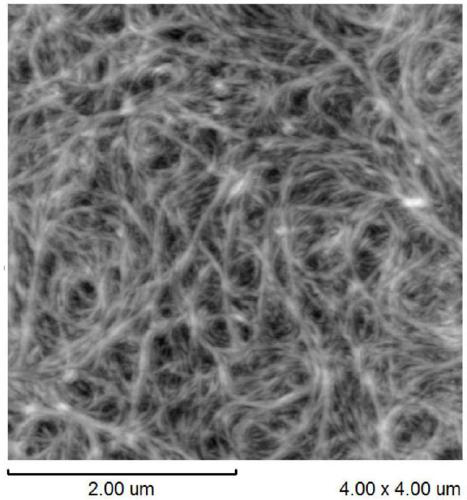Method for preparing micro-fiber collagen by utilizing ion liquid in different steps
An ionic liquid and microfiber technology, which is applied in the preparation methods of peptides, chemical instruments and methods, animal/human proteins, etc., can solve the problems of loss of biological activity, difficult removal, toxicity, etc., so as to reduce the amount of use and ensure biological activity. , the effect of reducing the cost of industrialization
- Summary
- Abstract
- Description
- Claims
- Application Information
AI Technical Summary
Problems solved by technology
Method used
Image
Examples
Embodiment 1
[0057] (1) Raw material pretreatment
[0058] In parts by weight, add 1000 parts of cowhide to 5000 parts of isopropanol, shake for 10 hours, remove the isopropanol when the time is up, then mix with 1500 parts of water and 0.2 parts of DTM198 enzyme, and use Na 2 CO 3 Adjust the pH to 9.0, stir for 30 minutes, and let it stand. Stir for 1-2 min for every 1 hour of standing. After standing for a total of 16 hours, filter the solid product, and then add the solid product to 3000 parts of peroxide with a mass concentration of 60g / L In hydrogen, it acts for 4.5h as a raw material for microfibrillar collagen.
[0059] (2) Step-by-step ionic liquid treatment
[0060] Cut the raw material of microfibrillar collagen into blocks with a diameter of 10mm, immerse them in a 30% mass concentration of 1-ethyl-3-methylimidazole acetate solution, and stir for 13h at a temperature of 4-15℃ After the action time is reached, the precipitate is centrifuged and washed, and then mechanically cut to a bl...
Embodiment 2
[0066] (1) Raw material pretreatment
[0067] In parts by weight, add 1000 parts of pig skin to 5200 parts of isopropanol, shake for 11h, remove the isopropanol when the time is up, then mix with 1550 parts of water and 0.25 parts of DTM198 enzyme, and use Na 2 CO 3 Adjust the pH to 9.1, stir for 35 minutes, and let stand for 1 min for every 1 hour of standing. After standing for a total of 16 hours, filter the solid product, and then add the solid product to 3100 parts of hydrogen peroxide with a mass concentration of 60g / L , Acting for 4.5h, as the raw material of microfibrous collagen.
[0068] (2) Preparation of microfibrous collagen
[0069] Cut the raw material of microfibrous collagen into blocks with a diameter of 10mm, immerse them in a 70% mass concentration of 1-butyl-3-methylimidazolium dinitrile salt solution, and stir at a temperature of 4-15℃ 11h, after the action time is reached, centrifuge to collect the precipitate and wash it, and then mechanically cut it to a blo...
Embodiment 3
[0075] (1) Raw material pretreatment
[0076] In parts by weight, add 1000 parts of sheepskin to 5400 parts of isopropanol, shake for 12h, remove the isopropanol when the time is up, then mix with 1540 parts of water and 0.22 parts of DTM198 enzyme, and use Na 2 CO 3 Adjust the pH to 9.0, stir for 35 minutes, and let it stand for 2 minutes for every 1 hour of standing. After standing for a total of 16 hours, filter the solid product, and then add the solid product to 3000 parts of hydrogen peroxide with a mass concentration of 60g / L , Acting for 4.5h, as the raw material of microfibrous collagen.
[0077] (2) Preparation of microfibrous collagen
[0078] Cut the raw material of microfibrous collagen into blocks with a diameter of 10mm, immerse them in a 50% mass concentration of 1-ethyl-3-methylimidazole tetrafluoroborate solution, and stir at 4-15℃ Act for 8h, after the time of effect is reached, centrifuge to take the precipitate and wash it, then mechanically cut it to a block wi...
PUM
| Property | Measurement | Unit |
|---|---|---|
| heat deflection temperature | aaaaa | aaaaa |
| specific surface area | aaaaa | aaaaa |
| specific surface area | aaaaa | aaaaa |
Abstract
Description
Claims
Application Information
 Login to View More
Login to View More - R&D
- Intellectual Property
- Life Sciences
- Materials
- Tech Scout
- Unparalleled Data Quality
- Higher Quality Content
- 60% Fewer Hallucinations
Browse by: Latest US Patents, China's latest patents, Technical Efficacy Thesaurus, Application Domain, Technology Topic, Popular Technical Reports.
© 2025 PatSnap. All rights reserved.Legal|Privacy policy|Modern Slavery Act Transparency Statement|Sitemap|About US| Contact US: help@patsnap.com

